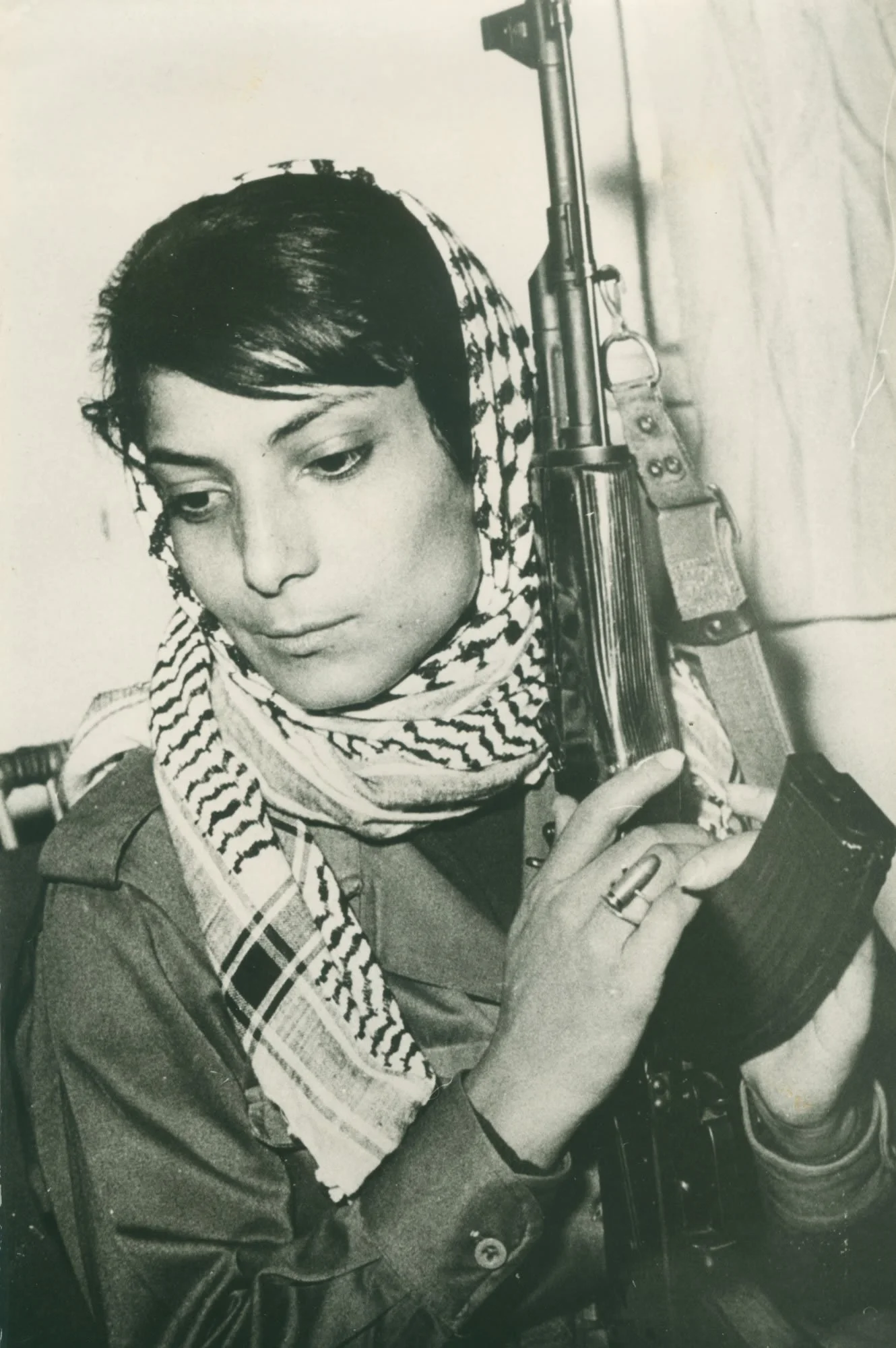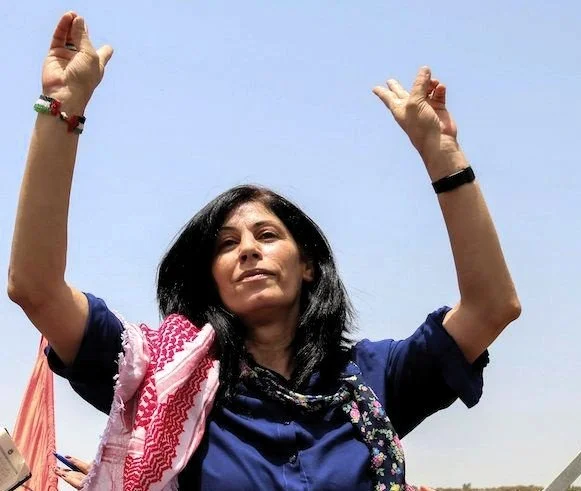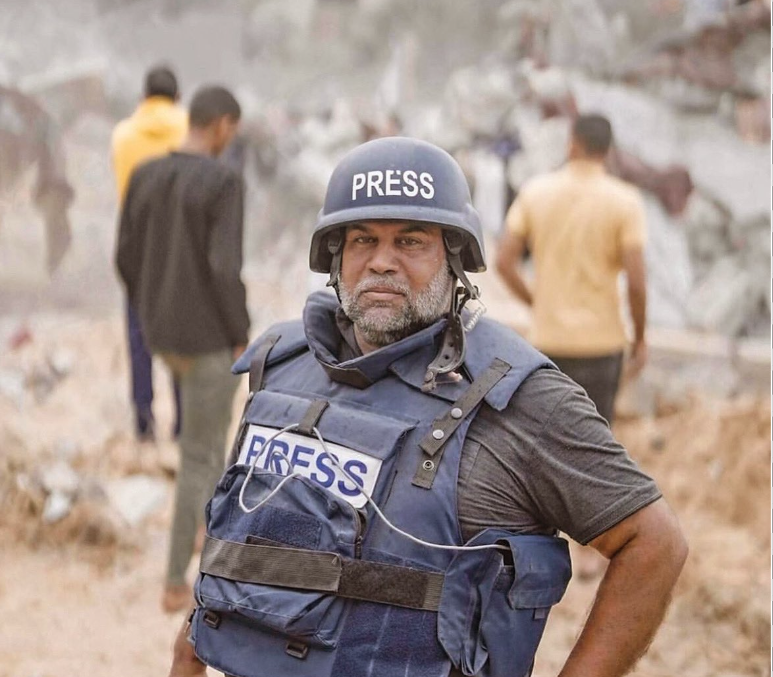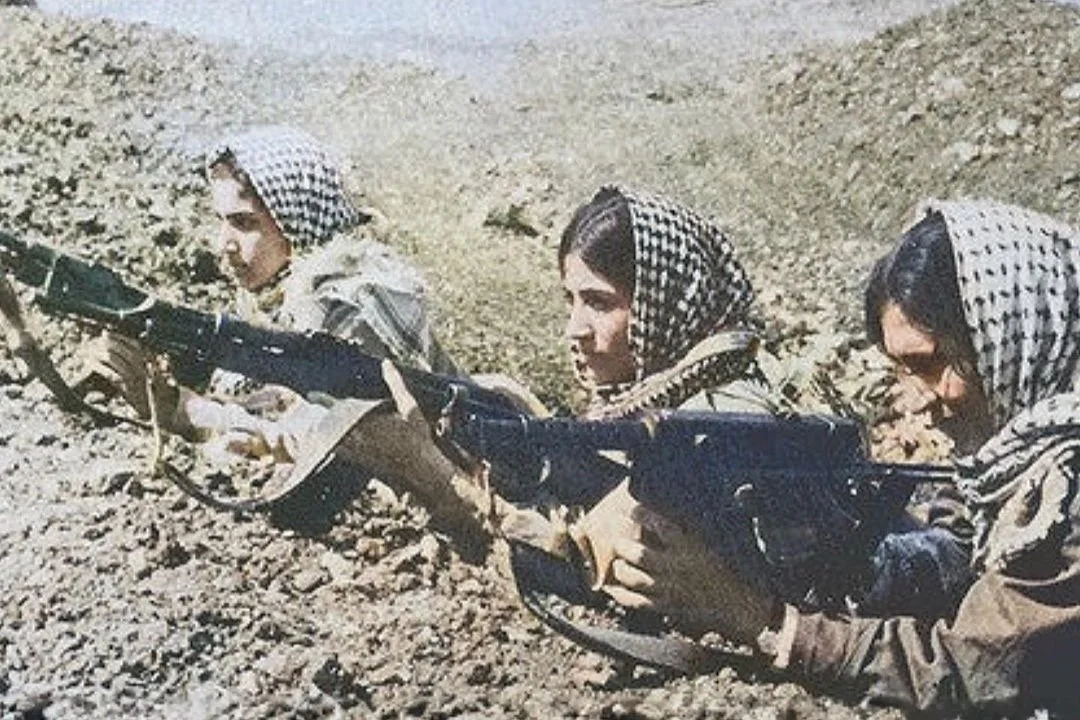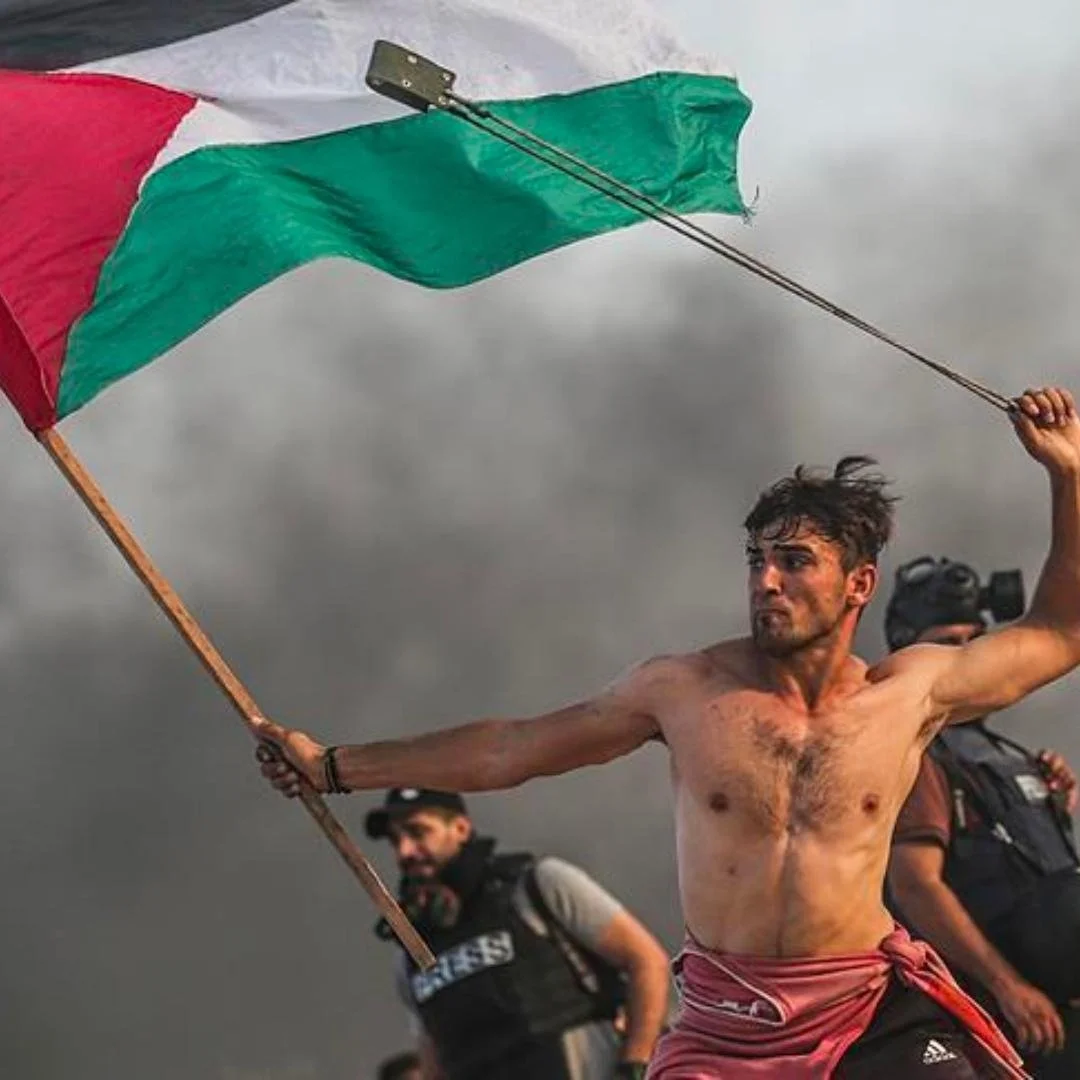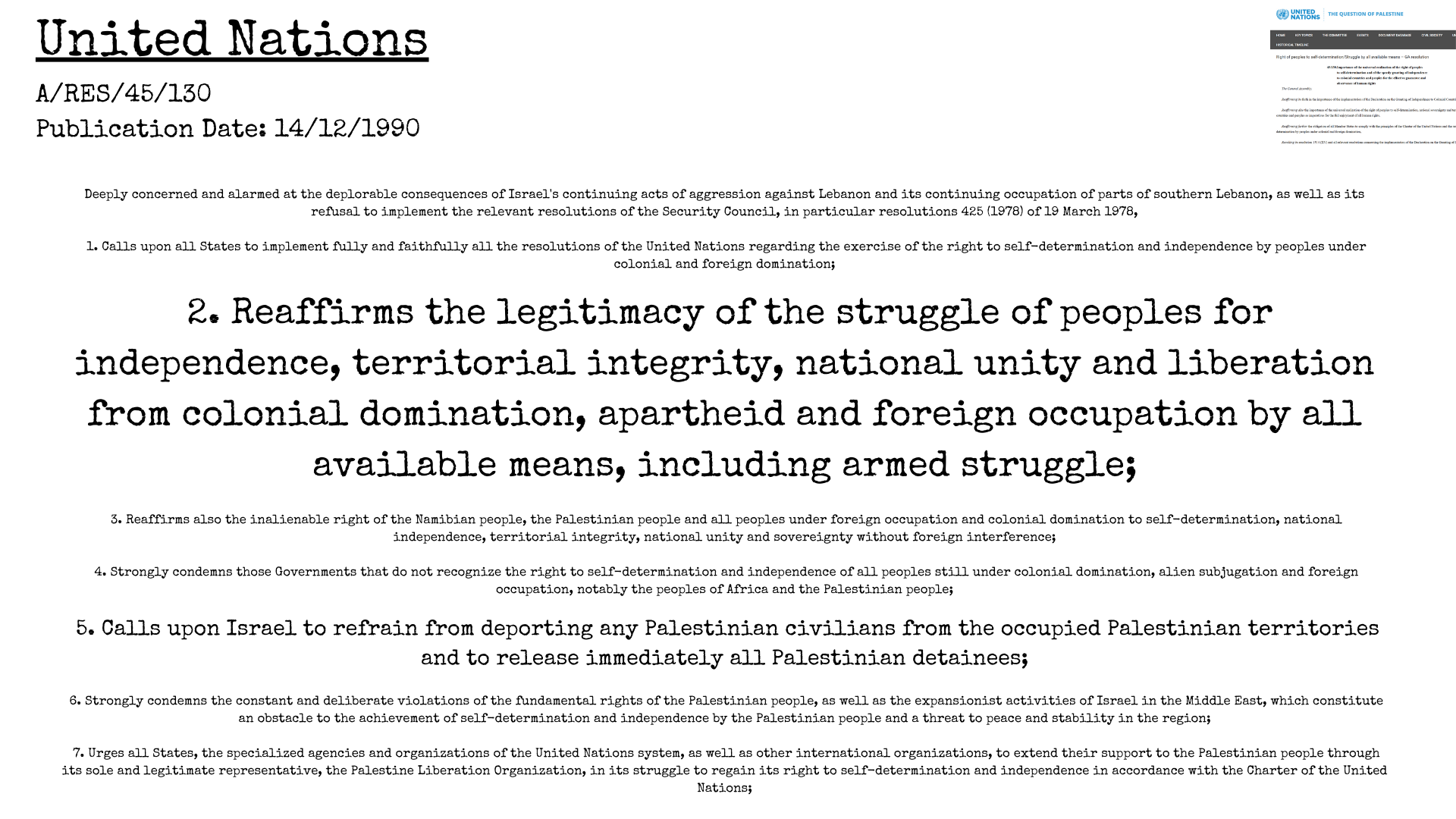Learning Experience Goal:
I will be able to describe the various ways in which the Palestinian people have resisted occupation.

5.1 What does it mean to “resist”?
This young woman is Bisan Owda, a twenty-five year old Palestinian filmmaker, activist, and journalist living in Gaza. This video was released on Bisan’s Instagram page to her 4.4 million followers on Saturday, March 24th 2024.
What is your immediate reaction to this video?
What is Bisan describing in this video?
In her caption, Bisan writes “share this, keep aware of the Genocide updates!” Why would Bisan write this?
Is Bisan performing an act of resistance in this video? Explain.
5.2 Examples of Palestinian resistance
Scroll through the photos, read the bios, and respond to the questions below.
PLEASE NOTE, the Palestinians are not a monolith. Views on the mentioned historical and current figures and movements vary, as can be expected within any diverse & multi-layered ethnic and cultural group. There are also bits of insight and information that the Palestinian people may have that is not widely known by outsiders. We have tried to be as factual as possible, but encourage you to always do your own further research.
Read the examples of Palestinian resistance above. Then match the correct statement below with an example of Palestinian resistance.
This resistance leader was sentenced to five life sentences.
The first woman to hijack a plane.
Currently under threat and targeted for reporting the current genocide in Gaza.
This resistance leader experienced the Nakba as a child.
Known for throwing rocks as an act of resistance.
Political leader who has been arrested several times.
Includes all Palestinians living outside of Palestine.
Founded the first official armed women’s organization against colonialism in Palestine.
Revolutionary author, intellectual, politician and icon of Arab culture and art.
Dive deeper: Stories from the First Intifada
The First Intifada was motivated by collective Palestinian frustration over Israel's twenty year military occupation of the Gaza Strip and West Bank.
Using Source A and B, Stories from the Intifada, answer the following questions:
Explain the similarities you heard from the stories in Part 1 & 2.
What are some examples of Palestinian protest during the First Intifada?
What was Israel’s response to the protests?
What is meant by civil disobedience when it comes to the First Intifada? (Part 2: @ 2:20)
When it comes to resistance, what can the First Intifada tell us about the current aggression on Gaza and the West Bank.
5.3 Understanding Palestinian resistance
Members of the Zahrat al-Uqhawan, or the Chrysanthemum Flowers who started as a relief organization and then became militant after witnessing a Palestinian child shot in the head & killed in his mother’s arms.
The Palestinian People & the unwavering principles of the Palestinian liberation movement - Thawabit. The Thawabit was formulated by the Palestinian National Council of the Palestinian Liberation Organization (PLO) in 1977, representing the core issues of national consensus on the Israeli–Palestinian conflict and "to which all Palestinian factions must pledge fealty":
* the right to resistance,
* the right to self-determination (statehood),
* Jerusalem as the capital of Palestine, and
* the right of Palestinian refugees to return
Timeline of Notable Resistance
1928 - The Muslim Brotherhood, a religiopolitical organization, is founded in Egypt. In response to the First Intifada (1987), a group that would be later known as Hamas emerged from an Islamic charity affiliated with the Muslim Brotherhood.
1929 - Al-Buraq uprising takes place, the first mass protests against increased Jewish immigration to Palestine.
1933 - Palestinians riot amid sudden rise in Jewish immigration from Nazi persecution in Germany.
1936-1939 - Arab Revolt or The Great Palestinian Revolt—a large scale uprising and general strike against the British Mandate and Jewish immigration occurs.
1948 - The Arab Israeli War of 1948 begins after the United Nations General Assembly adopts Resolution 181 declaring Israel an independent state and stripping Palestinians from much of their property, key agricultural lands and seaports. To resist the resolution, Egypt, Iraq, Transjordan, and Syria join forces with the Palestinian resistance and invade the former British Mandate of Palestine to fight the Israelis.
1950s - Members of the Palestinian diaspora, mostly in Kuwait, establish the Palestinian National Liberation Movement, later known as Fatah. They advocate for armed resistance.
1964 - Palestinian Liberation Organization (PLO) is founded. At the Palestine National Council, Ahmad Shokairi of the PLO declares Israel illegal.
1965 - Fatah starts armed attacks against Israeli targets and joins the PLO in 1967.
1967 - Popular Front for the Liberation of Palestine (PFLP) is founded. PFLP is a secular Palestinian Marxist–Leninist and revolutionary socialist organization.
1968 - Democratic Front for the Liberation of Palestine (DFLP) is founded. DFLP is a secular Palestinian Marxist–Leninist and Maoist organization.
1969 - Yassar Arafat is elected chairman of the PLO. Arafat embraces armed resistance as the way to Palestinian independence.
1971 - Black September Organization is founded after an armed conflict between Jordan and the PLO, led by Yasser Arafat.
1987-1993 - First Intifada. Collective Palestinian frustration over Israel's military occupation of the West Bank and the Gaza Strip lead to sustained protests, civil disobedience and riots,
1987 - Hamas is founded by a quadriplegic Palestinian activist, Imam Ahmed Yassin, in response to the First Intifada. Hamas is an Islamist militant group that currently governs the Gaza Strip.
2000-2005 Second Intifada - Second major uprising by Palestinians against the Israeli occupation.
2007 - Hamas wins democratic elections
2021 - Habbet Ayyar (May uprising) a widespread Palestinian revolt.
Do Palestinians have the right to resist?
Under international law and according to the United Nations, Palestinians- as oppressed peoples- have the right to resist “colonial domination, apartheid, and foreign occupation by all available means, including armed struggle…”
Palestinian resistance fighters are often referred to as terrorists whereas fighters for the Israeli occupation are referred to as soldiers. Why do you think that is?
Do you Condemn Armed Resistance?
Age-restricted, graphic images & content
5.3 Questions
Explore the sources within this section and answer the questions.
Why do Palestinians resist? What are they resisting?
Watch the video. Do you condemn armed resistance? Explain in your own words.
Analyze the above publication from the UN. (You will have to zoom to see the small text.) What does #2 mean?
Elaborate on any patterns you notice in the sources and timeline.
Explanation of Terms
Apartheid - Apartheid is a discriminatory political and legal system which emerged out of the white settler-colonial states of southern Africa in the first half of the twentieth century. The word apartheid means “apartness” in Afrikaans. (Read more here: Israel's Apartheid Regime, Interactive Encyclopedia of Palestine).
Democratic Front for the Liberation of Palestine (DFLP) - The Democratic Front for the Liberation of Palestine (DFLP) was founded in February 1969 when members within the Popular Front for the Liberation of Palestine (PFLP) decided to secede from the organization and to form a separate group. (Read more here: DFLP, Interactive Encyclopedia of Palestine).
First Intifada - 1986 was a year of armed confrontations, but after four Palestinian laborers from Gaza were killed by the Israeli military, demonstrations broke out. On 9, December 1987, in Jabaliya, the largest refugee camp in Palestine. Protests spread through the Gaza Strip, Jerusalem, and West Bank camps, villages, and towns. (Read more here: The First Intifada 1987-1993 Interactive Encyclopedia of Palestine).
From the River to the Sea - Upon its creation by diaspora Palestinians in 1964 under the leadership of Yasser Arafat, the PLO called for the establishment of a single state that extended from the Jordan River to the Mediterranean Sea to encompass its historic territories. (Read more here: ‘From the river to the sea’: What does the Palestinian slogan really mean?, Al Jazeera).
Intifada - An Arabic word that literally means “shaking off;” in the Palestinian context, it is understood to mean a civil uprising. (Read more here: Intifada - Palestine Uprising, Palestine Remix) also see First and Second Intifada).
Islamic Jihad or Palestinian Islamic Jihad(PIJ) - PIJ defined itself as “an independent, grassroots Islamist movement engaged in jihad. Its ideological basis is grounded in Islam; its means of operation combines grassroots and revolutionary work with armed jihad, and its goal is the liberation of Palestine from Zionist occupation.” The movement emphasized the Palestinian cause as “the most important issue in the Islamic world at this stage of its history,” and that to fight for it would be the gateway to achieving the goals of the broader Islamist movement. (Read more here: The Islamic Jihad Movement of Palestine, Interactive Encyclopedia of Palestine)
Palestinian Liberation Organization (PLO) - The Palestine Liberation Organization, or PLO, was first founded in 1964 during a summit in Cairo, Egypt. The organization’s initial goals were to unite various Arab groups and create a liberated Palestine in Israel. Over time, the PLO has embraced a broader role, claiming to represent all Palestinians while running the Palestinian National Authority (PA). (Read more here: PLO, History)
Popular Front for the Liberation of Palestine (PFLP) After the shock of the June 1967 War and the launch of Palestinian guerrilla activity, attempts at organizing and reorganizing Palestinian groups took place. The PFLP was founded in 1967 and remains the most powerful presence among the leftist organizations. (Read more here: The Popular Front for the Liberation of Palestine – PFLP, Interactive Encyclopedia of Palestine)
Second Intifada - The second Palestinian uprising (also known as al-Aqsa Intifada ) broke out due to several factors. Popular demonstrations and clashes with the Israeli army quickly spread to almost all Palestinian towns of the West Bank and Gaza Strip. In Israel itself, rioting spread to Acre, Jaffa, Nazareth, and to Israeli Arab towns across the Galilee. (Read more here: The Second Intifada, The Encyclopedia of Palestine)
Self-Determination or Palestinian Self-Determination - This concept recognizes that "the people of Palestine are entitled to equal rights and self-determination, in accordance with the Charter of the United Nations" and declares that "full respect for the inalienable rights of the people of Palestine is an indispensable element in the establishment of a just and lasting peace in the Middle East ."(Read more here: UNGA 2672 (XXV): People of Palestine Entitled to Equal Rights and Self-determination; Calling upon Israel for Return of Displaced in 1967, The Second Intifada, The Encyclopedia of Palestine)
Religiopolitical - religious and political. Religious-political issues may involve, but are not limited to, those concerning freedom of religion, applications of religious law, and the right to religious education. (Read more here: Religion in politics, wikipedia)
Resistance - An act or instance of resisting - opposition. (Read more here: Resistance Merriam Webster Dictionary)
5.4 Operation Al-Aqsa flood & the Israeli response
On the morning of October 7th, the military arm of Hamas, the al-Qassam Brigade, launched a coordinated, planned attack on Israeli settlements and military posts. They used tanks to break through barricades along Gaza’s border, gliders to fly over, and trucks and motorbikes to carry out what they called Operation Al-Aqsa Flood. Approximately 1,200 Israeli and foreigners in Israel were killed in the attack, either from Hamas or from “friendly fire” by the Israeli military. Around 240 Israelis were also taken hostage by Hamas, including civilians and military personnel. The intention was to use these hostages in exchange for the release of the estimated 7,000 Palestinians held unlawfully in Israeli military prisons.
Operation Al-Aqsa Flood is considered the “deadliest attack on Jews since the Holocaust.” Israel responded with Operation Iron Swords, which has been called a genocide and is responsible for the deaths of more than 30,000 Palestinians so far, most of them civilians, many of them children.
First…
And then…
And now… (updated on 4-3-24)
5.5 Reflect on your learning
What are the different methods Palestinians have used to resist Israeli colonization?
Do the Palestinians have a right to resist? Why or why not? Is there a wrong way and a right way to resist oppression? Explain your thoughts, using specific examples from what you have learned so far.
Is there any hope for peace moving forward? A Palestinian man interviewed in this video says, “Any free person will support resistance. As long as there is oppression, there is resistance. When oppression stops, resistance stops, too.” Do you think this is true? Why or why not?






